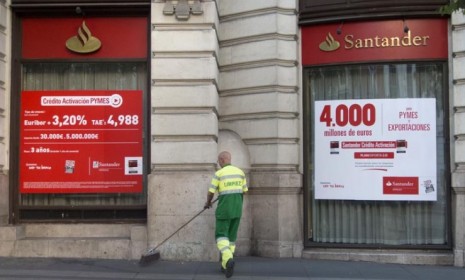Should Europe bail out Spain's banks?
Spain has eclipsed Greece as the epicenter of the continent's financial crisis, and its beleaguered banking sector is weighing down the global economy

On Wednesday, Spain's borrowing costs shot to dangerously high levels, stoking fears that Europe's fourth-largest economy will need a bailout to avoid going bankrupt. Spain's fiscal woes led to stock market drops around the world, and investors fled to safe havens in U.S. Treasuries and German bonds. Spain's problems stem from fears that the country is too broke to bail out its beleaguered banks, which are saddled with bad loans from a slumping real estate market. European Union officials have proposed creating a pan-European banking union that would provide aid directly to Spanish banks, and ease pressure on the Spanish government. However, Germany has balked, saying it doesn't want to be on the hook for the losses of Spanish banks. Is a banking union a good idea?
Yes. There is no other way to save Spain: The euro currency bloc will disintegrate unless Europe figures "out a way to salvage the region's banks," says Bloomberg in an editorial. Spain is "a perfect place to start," since no other country "better illustrates the mutually reinforcing links" between banks and their countries. A banking union would not only aid Spain's banks, but "create a model for bank recapitalizations throughout the euro area."
"Spain's banking rescue should become example for Europe"
The Week
Escape your echo chamber. Get the facts behind the news, plus analysis from multiple perspectives.

Sign up for The Week's Free Newsletters
From our morning news briefing to a weekly Good News Newsletter, get the best of The Week delivered directly to your inbox.
From our morning news briefing to a weekly Good News Newsletter, get the best of The Week delivered directly to your inbox.
And bailing out the banks beats bailing out Spain: As Spain veers closer to a bailout, "a looming question is where the money will come from," says Landon Thomas Jr. at The New York Times. Analysts estimate that it would cost around 500 billion euros to rescue Spain, which would nearly wipe out Europe's new 700 billion euro bailout fund, leaving little money for future bailouts. Plus, to qualify for a bailout, Spain would have to meet certain conditions — such as hitting budget targets — that could be disastrous for a country already in a deep recession.
"Europe fears bailout of Spain would strain its resources"
A banking union is inadequate to Europe's problem: A banking union "is probably totally unworkable unless accompanied by a full fiscal union," says James Saft at Reuters. This deal would merely transfer risk from a state to an "over-state" — in this case, the eurozone, which is essentially backed by a "big, solvent parent: Germany." This is just another troubleshooting measure that evades the only real solution to the crisis: "Much greater centralization of taxing and spending," so that all countries bear equal risk and abide by the same fiscal rules.
"No banking union without fiscal union"
A free daily email with the biggest news stories of the day – and the best features from TheWeek.com
-
 Bad Bunny, Lamar, K-pop make Grammy history
Bad Bunny, Lamar, K-pop make Grammy historySpeed Read The Puerto Rican artist will perform at the Super Bowl this weekend
-
 Political cartoons for February 2
Political cartoons for February 2Cartoons Monday’s political cartoons include ICE getting schooled, AI in control, and more
-
 Democrats win House race, flip Texas Senate seat
Democrats win House race, flip Texas Senate seatSpeed Read Christian Menefee won the special election for an open House seat in the Houston area